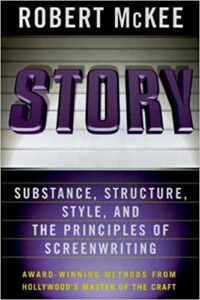Whether or not we are aware of it, we live our lives through stories. If it’s not the stories that others tell us, the ones we read, or the ones we watch on TV and the movies, then it’s the ones we tell ourselves. Given that stories are such an important part of how we view the world, the ability to tell compelling stories is important. It’s especially important when you are building a business and trying to market your product and services. I know because I’ve been there and am living it now.
I hadn’t given much thought to studying how to tell a story until I read this article on Matt Blumberg’s blog. It was this excerpt from the article that inspired me to learn more about the art of storytelling:
“In business, the best story wins.” That’s another quote from a former manager of mine that I have found to be universally true. People in business respond to many things: numbers, bullet points, graphs and visualizations. But they respond to all of those things better when they are wrapped in stories…. When you can present your hypotheses in the context of a story, about your business, your customers, what you want to achieve, how you will do it, and why it matters, you will build consensus and show leadership.
In his post, Blumberg recommended reading Story: Substance, Structure, Style, and the Principles of Screenwriting by Robert McKee as a way to learn about and improve your storytelling. While the book is primarily targeted at screenwriters, Blumberg asserted that it would help you think about “all the elements that go into a good story”. I figured it was worth taking a flyer to see if I could improve the way I present things to people, in particular my business, and the products and services I offer.
As you would expect, the book details how to tell a compelling story if you’re writing a screenplay. I want to be very specific here – it’s not about writing a book, a play, or a marketing message. It is specifically geared toward writing a story for the big screen.
Overall, I found the book interesting, detailed, and well written. Through examples referenced in the book, it became obvious to me why some movies have become classics that have stood the test of time while others were flops. The classics incorporate all the elements of a good story and tell it better through the media of film.
On the other hand, I found it only mildly applicable to business. Sure, there are some great points here and there, but not enough to justify pouring through 450+ pages of detail. If you’re an aspiring screenwriter, then yes. This book clearly needs to be at the top of your list and on your bookshelf. It’s a reference book that you will read and want to reread many times. For business, I’d suggest passing on this one. A better book to read on crafting business stories is Donald Miller’s Building a Story Brand, which I highly recommend.
I’m not disappointed I read Story. If anything, it’s given me a whole new appreciation of the effort and work that goes into writing a good screenplay. And for what it’s worth, it’s also made me more critical of the few movies and shows I do watch, much to Lisa’s chagrin. I’m sure she’d rather I just sit back and enjoy the entertainment rather than picking it apart. Unfortunately, putting that genie back in the bottle is not going to happen.

